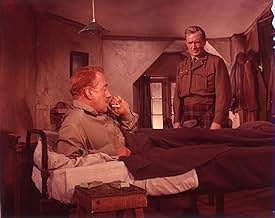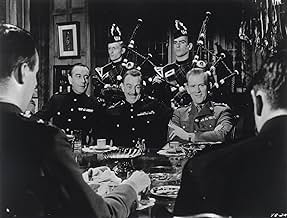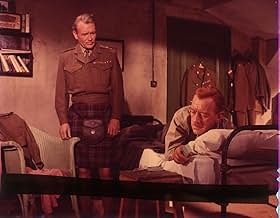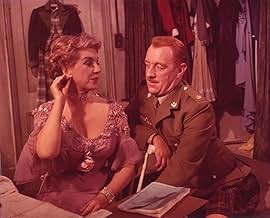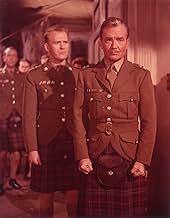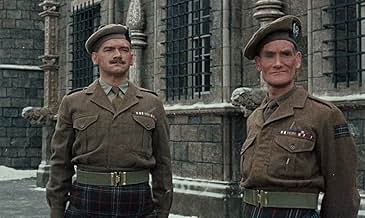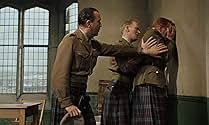Ajouter une intrigue dans votre langueAfter World War II, a Highland Regiment's acting Commanding Officer, who rose from the ranks, is replaced by a peace-time Oxford-educated Commanding Officer, leading to a dramatic conflict b... Tout lireAfter World War II, a Highland Regiment's acting Commanding Officer, who rose from the ranks, is replaced by a peace-time Oxford-educated Commanding Officer, leading to a dramatic conflict between the two.After World War II, a Highland Regiment's acting Commanding Officer, who rose from the ranks, is replaced by a peace-time Oxford-educated Commanding Officer, leading to a dramatic conflict between the two.
- Nommé pour 1 Oscar
- 2 victoires et 7 nominations au total
Avis à la une
Sadly, for him, his informal barracks is going to be reformed under the auspices of the public school via Sandhurst graduate Lt. Col. Basil Barrow (John Mills) who believes in doing all things by-the-book. This sets the scene for a post WW2 power battle under a grey Scottish winter sky.
When writing a review of any excellent film - such as this - you are frightened you are going to put people off by its limits. However this is a classic example of less really being more. The claustrophobic atmosphere and the sense that armies without wars are prone to be heavy with politics. Not unlike like prisons: To many people in the same space with too much time on their hands. They drive men mad and extend the worst in the human character.
Guinness and Mills are fantastic actors. Oscar winners both and more. They could read the phone book and captivate an audience. For the record they had both seen war service, although Mills baby face and short stature had made him the butt of many jokes (many he was happy to re-tell). Did this help form his character? The guy who was laughed at and therefore worked even harder to enforce discipline or gain respect. This is, naturally, speculation.
I have no the knowledge of author (of book and film) but just by watching you know he has seen it for real. The little details that only the insider would know. The story would just as well be served as a theatre piece and it employs some its stock devices. The accidental narrator being the more obvious. Maybe this was to save money, but it would not have helped the picture to see - say - the incident that Mills had to endure from the Japanese.
Eyewitness testimony from the filming says that Guinness thought he would look silly in a kilt and used fake tanner on his pale legs. He is not the biggest of men and has to stick out his chest and stand on tiptoe to be imposing, but you do believe him. What an actor he was. An actor's actor. Like Peter Sellars, totally bland out of character (and not always very nice as he writes in his various autobiographies) but always mesmeric on screen. Mills - on the other hand - could never work as a bad guy. The perfect uncle figure who you would want to confide in.
(I am maybe giving the support cast short-shrift - but most British films of the time had quality character actors. No exception here. Amazing to see Susannah York in her first role.)
Alfred Hitchcock himself said Tunes of Glory was his own personal favourite film. It is not quite mine, but a great demonstration of how brilliant film can be when top class actors get their teeth in to a wonderful script. The end is pure Shakespeare. Don't watch it once, watch it twice...
The book is a slim volume, but is fast moving and full of character. Set in provincial Scotland, the flavour of the film is as strong as the novel (by James Kennaway who also wrote the screenplay) but the characterisation by the actors builds on and then surpasses the script. I note that neither of the actors is Scottish and this amazes me. Maybe I should seek advice from a Scot on this matter.
We never leave the barracks or the quiet army town and so learn only by rumour how Jock Sinclair, on some blasted field at the centre of El Alamein saved his regiment and turned the battle. Half the officers and men were dead, the cause lost, yet his spirit and the force of his will brought him a battlefield promotion to acting colonel. The Regiment is what he lives for.
Several years later, in peacetime, the army catches up with its paperwork and sends a proper officer to take back the reins. Basil Barrow arrives unexpectedly from a desk job and Sandhurst. His assignment is to organise and civilise the men, long gone wild under Jock's supervision. John Mills plays the rather impotent lonely Barrow as an accentless and educated man. There are "dark rumours" amongst the men that he may be English.
The clash between the two men commences immediately on their meeting and ends in scenes of mourning and redemption.
This is an actors film. There are few effects and much of the action is centred on one or the other of Guinness or Mills. Sinclair is a piper, this gives him an almost spiritual air and his feel for music (the Tunes of Glory) is the first area of contention between the two Colonels. When Jock leads his men in a wild and unruly reel with arms flailing and much shouting and yipping at a society ball the ensuing fit from the uptight and conservative Mills is wonderful. He trembles and shakes and we do likewise.
The film builds and builds to a finale full of Tunes of Glory and we come to an understanding about both men, as they come to understand each other.
The more I watch this film, the more I appreciate the wealth of detailed characterization it contains. On Barrow's first meeting with the officers of the regiment, as he is introduced to the rotund Major "Dusty" Miller, note John Mills' quick downward glance of disapproval at the Major's corpulent gut. In the following scene, where Jock Sinclair offers Barrow a whiskey, Barrow courteously replies that whiskey does not agree with him, to Jock's dismay. We later learn that Barrow is emotionally unstable, has problems controlling his rage, and that his family life has broken up. Could alcoholism be an issue, explaining his aversion to whiskey? While Guinness and Mills are justly praised, I find the performance by Dennis Price as Major Charlie Scott to be very interesting as well. Bringing to mind Ralph Richardson, he exudes an oily, genteel but detached sort of upper-crust English manner that Colonel Sinclair gleefully mocks ("old boy, old boy, old boy"). When RSM Riddick (Percy Herbert, distractingly bringing to mind Michael Palin in appearance and exaggerated military manner) tries to officially express the doubts of those in his own strata in the military hierarchy about the prosecution of Jock Sinclair, Barrow's first reaction is curiously bemused and sarcastic ("you astonish me"). Barrow subsequently snaps into martinet mode and brusquely dismisses Riddick's petition. His initial bemusement, though, is telling in that his instinct is not to take this man, from a lower level of the social and military hierarchy, seriously at all, treating him almost as an unruly child who needs be put in his place. Having seen power struggles, personality clashes, and class divisions like this in my work experience, I see that this all rings true. As foreign, exotic, and strange as the setting, characters, and language are to an American like me, the themes of this story are so universal that they can be immediately appreciated by almost anyone who's experienced life to some degree.
As for the language, it's a delight to finally have a DVD with English subtitles to clarify some of the spoken lines. The picture, by the way, is excellent on the new DVD, except for the intermittent appearance of a dark streak down the right side of the screen near the end of the film. I would have thought this could be fixed with digital restoration, but the cost of that might have been prohibitive, and though a little distracting, it really doesn't spoil my enjoyment. I think it's fitting that there are no negative reviews here thus far.
Guinness plays an angry and blustering Scottish officer who may also be an alcoholic (he at least is a problem drinker and shows many signs of alcoholism). The film begins with this popular officer throwing a farewell party, of sorts, with the men in his command. It seems that Guinness was given temporary command but a replacement (John Mills) is due to arrive shortly--dashing Guinness' hopes for this position becoming permanent.
Because Guinness' character is so very flawed and petty, he does much to try to undermine the new C.O.. In particular, Mills is a "by the book" sort of officer and Guinness ignores changes Mills orders--and by example, derision and a lack of respect for Mills spreads through the ranks. Instead of behaving like officers and gentlemen, the men behave like this is some sort of popularity contest and they show contempt for their new leader. None of this is helped by Guinness' drinking, as it gets him in trouble and creates serious problems for the regiment.
While Mills, as usual, does a great job in the film playing a man who is suffering from Post-traumatic Stress Disorder, the film is definitely Guinness'. His boorish character is a great example of him once again immersing himself into a character and the way he responds to the tragedy near the end of the film gives the character great depth and a bit of sympathy--something you needed to make this a stand-out film.
The bottom line is that this film is extremely well-crafted. The acting is universally excellent, the script tense and well-written and the film is great unless you are the type of person who demands lots of action. While a film about the military, this is no action film. Wonderful.
Le saviez-vous
- AnecdotesSir Alec Guinness was offered the role of Lieutenant Colonel Barrow, but asked for the role of Major Sinclair instead. He then suggested Sir John Mills for the other role.
- GaffesPipe Major MacLean is never shown with a set of bagpipes. In particular, he is a mere observer at band practice. A pipe major is not only the leader of the band but also its chief instructor, and it is unthinkable that he would not play an active role in all practices.
- Citations
Major Jock Sinclair, D.S.O., M.M.: We're on a first name basis in this regiment. Your first name is Derek. My first name is Major.
- ConnexionsFeatured in Film Extra: Alec Guiness (1973)
Meilleurs choix
- How long is Tunes of Glory?Alimenté par Alexa
Détails
- Date de sortie
- Pays d’origine
- Langue
- Aussi connu sous le nom de
- Tunes of Glory
- Lieux de tournage
- Stirling Castle, Stirling, Écosse, Royaume-Uni(establishing shots)
- Sociétés de production
- Voir plus de crédits d'entreprise sur IMDbPro
- Durée1 heure 47 minutes
- Couleur
- Rapport de forme
- 1.66 : 1
Contribuer à cette page



